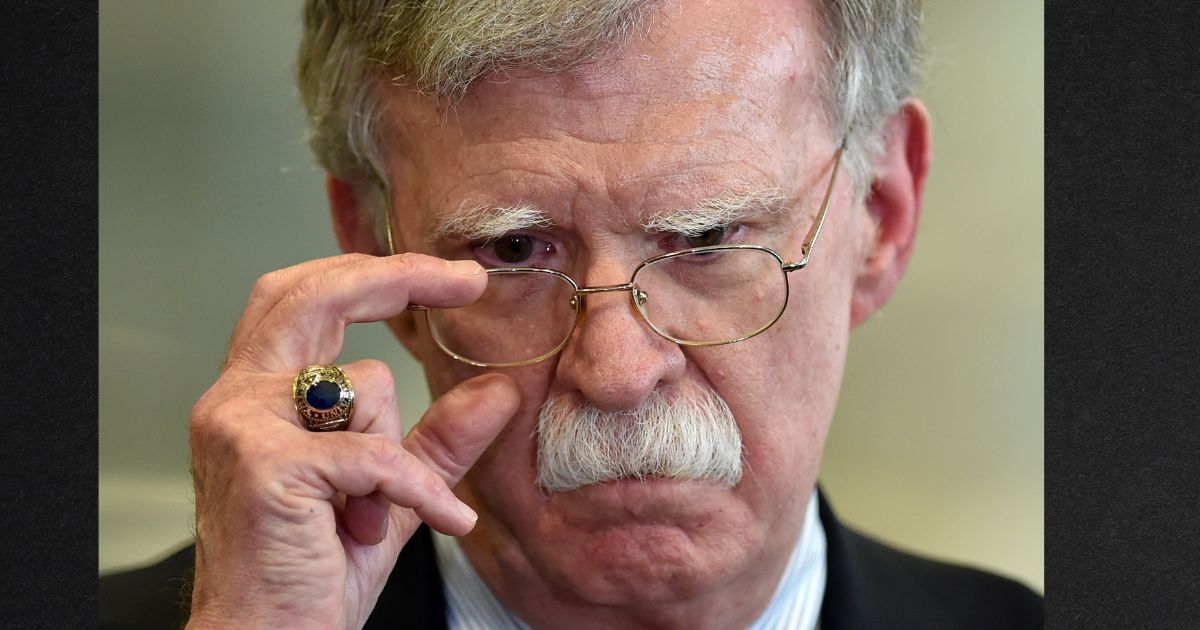Former National Security Adviser John Bolton has been charged with 18 criminal counts under the Espionage Act, according to a sweeping 26-page indictment released by the Department of Justice. The charges include eight counts of transmitting national defense information and ten counts of unlawful retention of classified materials.
Prosecutors allege that Bolton, who served as National Security Adviser under former President Donald Trump, mishandled highly classified national defense information during and after his tenure in the White House. The indictment claims that between April 9, 2018, and August 22, 2025, Bolton “abused his position” by sharing more than a thousand pages of information relating to his official duties, including material classified up to the TOP SECRET/SCI level, with two unauthorized individuals, identified in the document only as Individuals 1 and 2.
The DOJ filing also details a cyber breach involving Bolton’s communications, stating that he was hacked by a cyber actor linked to Iran but failed to disclose what kinds of classified materials he had been transmitting through the compromised account. Investigators allege that Bolton’s lack of transparency obstructed efforts to assess potential national security damage.
In addition to the transmission charges, the indictment accuses Bolton of unlawfully retaining classified documents, writings, and notes related to national defense matters at his home in Montgomery County, Maryland. These materials reportedly included information marked TOP SECRET/SCI, the highest classification level in the U.S. intelligence system.
The indictment paints a picture of a senior national security official who, over several years, allegedly ignored strict handling protocols for sensitive defense information. The DOJ has not yet announced whether additional individuals connected to the case will face charges.
🚨 BREAKING: “John Bolton was just indicted by a grand jury. Do you have a reaction to that?”
PRESIDENT TRUMP: “I didn’t know that. You’re telling me for the first time! I think he’s a bad person. Too bad.”
“That’s the WAY IT GOES, RIGHT?” 😂
“He’s a BAD person.” 🔥 pic.twitter.com/QDH4TPFttA
— Eric Daugherty (@EricLDaugh) October 16, 2025
Indictment Alleges Bolton Sent Top-Secret Intelligence Through Personal Email and Messaging Apps, Concealed Hack Linked to Iran
According to the indictment, from April 9, 2018, through September 15, 2019, former National Security Adviser John Bolton regularly sent “diary-like entries” containing information classified up to the TOP SECRET/SCI level to two unauthorized individuals, referred to as Individuals 1 and 2. These transmissions, the filing states, were made “through a commercial non-governmental messaging application.”
The indictment further alleges that Bolton, on multiple occasions, used personal, non-governmental email accounts—including those hosted by AOL and Google—to send classified material to Individuals 1 and/or 2 at their personal email addresses. These messages, prosecutors say, contained some of the nation’s most sensitive defense and intelligence information.
The document also reveals that Bolton failed to disclose the truth after being hacked by “a cyber actor believed to be associated with the Islamic Republic of Iran.” According to prosecutors, the hacker gained unauthorized access to the classified and national defense information that Bolton had previously sent to Individuals 1 and 2 through the compromised account.
The indictment states that Bolton’s representative did not inform the U.S. government that the hacked account contained classified or national defense materials from his tenure as National Security Adviser. Furthermore, it alleges that “at no point did Bolton tell the FBI that, while he was National Security Adviser, he had used the hacked email account to send Individuals 1 and 2 documents relating to the national defense, including classified information.” Nor did he disclose that Iranian-linked hackers had obtained that information, the filing adds.
The indictment provides a detailed summary of the documents Bolton allegedly transmitted to individuals without authorization—materials that investigators believe were subsequently accessed by the Iranian hacker.
One such document, prosecutors say, “reveals intelligence about a future attack by an adversarial group in another country,” while another “reveals liaison partner sharing sensitive information with the U.S. intelligence community.”
In January 2019, Bolton allegedly sent a document that “revealed intelligence showing a foreign adversary’s plan for a missile launch; details of a covert action in a foreign country related to sensitive intergovernmental efforts; and the sensitive sources and methods used to collect human intelligence.”
A June 2019 transmission reportedly contained “intelligence about an adversary’s awareness of planned U.S. actions; intelligence concerning planned attacks against U.S. forces abroad; human intelligence derived from sensitive sources; a covert action program; and intelligence collected on the leader of an adversary nation’s military group.”
The indictment also cites a July 2019 document that “reveals intelligence on an adversary’s leaders,” and an August 2019 communication that “reveals intelligence about a foreign country’s dealings with an adversary, including direct quotations gathered through intelligence sources, foreign intelligence describing an adversary’s planned attack on a facility, and sensitive covert actions and methods used for collection.”
Finally, the September 2019 set of documents allegedly included intelligence on “a covert action planned by the U.S. government and confirmation that a foreign adversary was responsible for an attack,” as well as material that “reveals a covert operation conducted jointly by the U.S. government and a liaison partner, along with specific details about that action.”
Collectively, the indictment portrays a sustained pattern of reckless handling of classified intelligence and concealment of a serious foreign cyber breach that may have compromised some of the United States’ most sensitive national security information.

